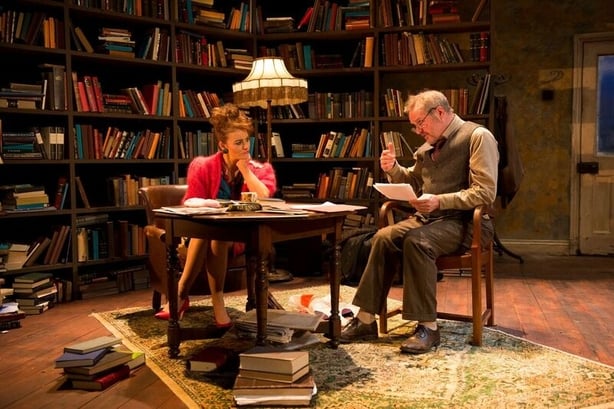How do you relocate Willy Russell's classic Liverpudlian play Educating Rita to 1980s Belfast? Oisin Kearney, who worked with playwright Willy Russell on the new version, breaks down the process.
When I arrived at Willy Russell’s office in Liverpool, the playwright humbly greeted me and we sat down to read through the script of Educating Rita, him stopping every so often (like his character Frank) to explain a literary reference and to discuss with me the issues around relocating the play to Belfast in 1980. It was a conversation about literature, scriptwriting, and society that sent my head whirling.
I immediately felt like Rita, in an unfamiliar setting, inadequate, but determined to give it a go. Willy explained how Educating Rita has been adapted before, in South Africa and in the United States, but we agreed that placing the characters and their story in Northern Ireland provided its own unique challenges. I was grateful that he trusted me with it.
I set to work identifying the obvious lines that could be easily changed to sound authentic to Belfast - 'bleedin' to 'bloody'/ 'Formby' to 'Holywood' – but throughout the revision process, I reminded myself that audiences are very discerning, and that subtlety is much better than exaggeration.Once spoken in the Belfast vernacular, most of Rita's speeches work quite well, but through a number of linguistic tweaks, and a couple of carefully chosen omissions, Belfast Rita could be born on the page. However, it was only in the rehearsal room that she truly came to life, when Kerri Quinn made the role her own.

the Lyric Theatre Belfast production of Educating Rita
Given that the play is brimming with literary references, it was important for this production to include local poetic texts. For example, the joke where Rita confuses W.B. Yeats with Yates Wine Lodge was too specific to the North of England, so it was an opportune point to fit in Northern poet Louis MacNeice, with an equally simple gag.
The most challenging element of relocating the play was the political context. When Rita speaks of 'culture', what could this mean at that time of vying prescribed cultures? How far did what was happening in 1980 permeate daily life? Could Frank's room be a sanctuary from the brutal conflict on the other side of his window?
I spent months researching academic works, chatting to relatives, meeting with staff at the Open University, interviewing ex-prisoners, and poring over archive of that dark time. Stop-searches, raids, riots and bomb alerts induced fear and a lack of connection. Many people had hidden identities. Some felt hermetically sealed in to their communities, unable to move about or explore new interests. Set in this climate, Rita's struggle for freedom and change is even more extraordinary. By the time the play is set to begin in late January 1980, over 2,100 people had lost their lives in the Troubles, and with the hunger strikes on the horizon, the situation wasn't getting any better.
After two critically acclaimed runs at the Lyric Theatre in Belfast, I am delighted that Kerri and Michael are touring the show throughout Ireland. The ease with which we could relocate Educating Rita to Belfast in 1980 is a testimony to the strength of Willy Russell’s original writing, and the universality of the themes of self-improvement in the face of societal stagnation. The play is as relevant today as it was then, in Liverpool, in Belfast, in Dublin and beyond, as it raises questions about the choices we have and how we can bravely better ourselves despite the current seemingly insurmountable limitations of our environment.
Educating Rita runs at The Gaiety, Dublin from 21 - 25 March, and at the Everyman, Cork from March 28 - April 1st.

